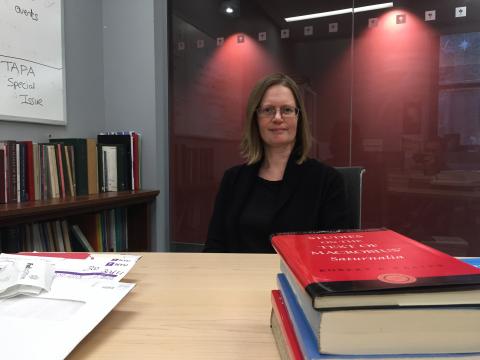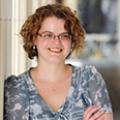Ayelet Haimson Lushkov and Helen Cullyer
March 14, 2018
A Day in the Life of a Classicist is a monthly column on the SCS blog written by Prof. Ayelet Haimson Lushkov celebrating the working lives of classicists. If you’d like to share your day, let us know here.
Hellen Cullyer is Executive Director of SCS.
There are days when I am traveling, days when I spend hours in front of my computer because of a looming deadline, and days when I am on the phone / email / Skype most of the day dealing with a crisis. However, a typical day is something like the following on Monday-Thursday. Friday is different, as I explain below. On the average Monday-Thursday, I wake up early and have a quick breakfast before running out of the house to get my train. My work day starts as soon as I sit down on the train. I look at the to-do list that I have written the night before, and take stock of the whole state of the organization and figure out if there is anything crucial that I am forgetting to do. I also catch up on email during this time. Emails may be from members, directors, officers, committee members. At the moment, I have multiple email threads with President Joe Farrell in any given day. For his sake, I hope things will calm down a bit soon.
When I get into the office, I will either sit down at my computer to draft or review something, or check in with Cherane (who is responsible for the planning of the annual meeting and all our smaller meetings such as board meetings) or Erik (who runs the placement service and does a whole lot of other things). I then check in with them frequently throughout the day. They are awesomely efficient, make my job a whole lot easier, and ensure that we are both ticking along and innovating. I try to carve out a couple of hours in the morning for sustained work on something, usually writing a report or proposal or a working with spreadsheets on data. I usually have at least one long phone call or meeting per day with someone (recently VPs, committee chairs, Joe, funders, representatives of other scholarly societies, and classics organizations). Then I do lots more email. Fridays are Financial Fridays. I try to consolidate all accounting and financial work each week into one day and find that Friday works best for me. This enables me to round up all payments, deposits and financial reporting work into a manageable and coherent package and also allows me to take stock of the financial position of the organization once a week.
I try to organize my time so that I am devoting equal attention to each division and activity of the organization, but during the run up to the annual meeting, I am working pretty much full time on the meeting and this is also true of Cherane and Erik. There is so much to coordinate: food and beverage; last minute adjustments to the program and abstract books in their various formats (print / PDF, HTML, and the annual meeting app); audiovisual equipment; volunteer schedules; placement interviews; agendas and reports for committee meetings and the board; and shipping stuff to the annual meeting hotel. The three of us divide the labor.
There are no words to describe the meeting itself. During the meeting, I sleep about four hours a night if I'm lucky. When I try to go to bed early, I find that I just can’t sleep. I spend my days in committee meetings. I get to attend very few sessions, basically just special events that are scheduled in the evening so as not to conflict with any meetings.
What gets me up in the morning? Literally, my son! How much time do I get to spend with my son? Not enough. Metaphorically, what gets me up in the morning regarding SCS? Two things, one negative and one positive. When you manage an organization, you have maintain an attitude of constant vigilance. That means dealing with problems as they arise, anticipating problems, and constantly asking oneself, "What am I forgetting to do?" It helps to be a little paranoid. On the positive side, what gets me up in the morning is that SCS has been around for 150 years and we are still here. Despite the cries of crisis, there are students who are passionate about the study of the ancient world. We are seeing increasing application numbers from undergraduates for the Pearson Fellowship and Minority Scholarships. There are very important debates going on about Classics and diversity that enrich the field. There are new approaches to research and pedagogy. How much time do I get to spend on the exciting stuff? Not enough.

During the work day I try not to distract myself too much. I have too much to do. However, if I need a break I will go out for a walk and grab a coffee. On the train home, if I am not furiously again writing emails that require sustained concentration, I will listen to music. Classical music if I require inspiration and songs from the 70s, 80s, or 90s if I am angry, sad or exuberant.
My ideal is that I get home just after 6pm, check my email once more, then turn off my phone and all devices. However, frequently that is not possible. Particularly in the months prior to the annual meeting, I work pretty late into the night. I am not great at switching off even after I have switched off my devices. My mind wanders and I find myself trying to figure out solutions to work-related problems during non-work time. I want to say that I am a frequent attendee of the theater, movies, concerts, and other events in New York. It is truer to say that my non-professional life revolves around laundry, grocery shopping, children's birthday parties, and late-night TV watching.
What do I wish classicists knew about the way I work? I'll answer this from an organizational rather than a personal one. I laugh heartily when people ask me to refer something to the SCS "IT department" or "accounting department". We are an old organization with an international presence, and some longstanding projects and publications. But in the end SCS is three people in the central office at NYU, two scholars dedicated to bibliography, and a bunch of energetic officers, directors, and committee members, who all have day jobs! For the scale of the organization and its reach, we are small in terms of our infrastructure and staff numbers. We do the best that we can.
Quite often when I tell people what I do and how I was trained, they ask me “Why do we need to study classics?” What I wish people knew, and what I try to explain, is that classicists study the past but are of the present, and study the ancient world to understand not only the distant past but also the contemporary moment and all that has led us here. I also wish people understood better that classics is about asking how and why and being critical and thoughtful about the Greek and Roman worlds and their relation to other times, places, and people. Classicists are not just cheerleaders for Greece and Rome.
Authors



